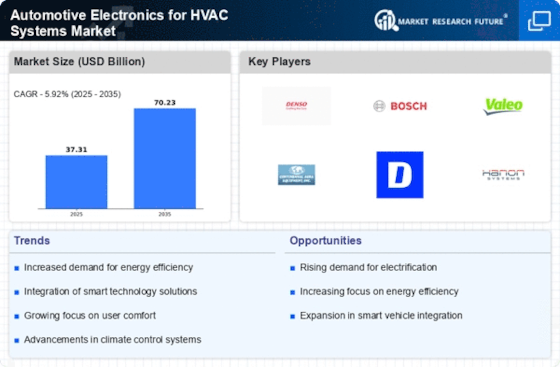Top Industry Leaders in the Automotive Electronics for HVAC Systems Market

*Disclaimer: List of key companies in no particular order
Top listed global companies in the Automotive Electronics For Hvac Systems industry are:
Mahle GMBH
Denso Corporation
Valeo Group
Continental AG
Sensata Technologies Management Co., Ltd.
STMicroelectronics
Infineon Technologies AG
Hanon Systems
Texas Instruments Incorporated.
Keihin Corporation
Sanden Holdings Corporation
Johnson Electric Holdings Limited
Calsonic Kansei Corporation
Bridging the Gap by Exploring the Competitive Landscape of the Automotive Electronics For Hvac Systems Top Players
The automotive electronics for HVAC systems market is a dynamic and growing sector, fueled by rising demand for comfort and convenience features, technological advancements, and increasing vehicle electrification. This competitive landscape is characterized by established giants and emerging players vying for market share through diverse strategies.
Key Player Strategies:
Tier 1 Suppliers: Major players like Continental, Valeo, and Denso are leveraging their established relationships with OEMs and extensive product portfolios to dominate the market. They focus on research and development (R&D) in areas like thermal management, sensor technologies, and energy efficiency to maintain their edge.
Component Specialists: Companies like Texas Instruments, NXP Semiconductors, and Sensata Technologies specialize in specific components like microcontrollers, sensors, and actuators. They offer cost-effective solutions and collaborate with OEMs and Tier 1 suppliers for integration into HVAC systems.
Emerging Players: Startups and technology companies are entering the market with innovative solutions like smart climate control systems, AI-powered temperature regulation, and connected car technologies. They aim to disrupt the market by offering differentiated features and user-centric experiences.
Factors for Market Share Analysis:
OEM Partnerships: Strong relationships with major automotive manufacturers grant significant market access and influence component selection. Tier 1 suppliers like Continental and Denso benefit from these partnerships.
Technology Leadership: Continuous investment in R&D and innovation is crucial for differentiation and market share gain. Companies like Texas Instruments and NXP Semiconductors excel in this aspect, offering advanced sensors and control algorithms.
Cost Competitiveness: Cost-effective production and supply chain management are essential, particularly in the aftermarket segment. Component specialists like Sensata Technologies and emerging players with lean operations stand out in this area.
Regional Focus: The market varies significantly across regions. Asia-Pacific, driven by rapid vehicle production and rising disposable income, is the largest market. Europe and North America follow, with stricter emission regulations and a focus on premium features influencing demand.
New and Emerging Trends:
Electrification: The transition to electric vehicles (EVs) presents new opportunities and challenges. EV-specific HVAC systems that optimize battery range and passenger comfort are in demand. Companies like Hanon Systems and Valeo are actively developing solutions in this area.
Connectivity and Smart Features: Integration with connected car technologies and AI-powered control is gaining traction. Remote climate control, personalized temperature settings, and voice-activated commands are becoming increasingly common features. Companies like NXP Semiconductors and emerging startups are at the forefront of this trend.
Sustainability: Focus on eco-friendly refrigerants and energy-efficient technologies is growing due to stricter emission regulations and environmental concerns. Companies like Marelli Corporation with its air purification systems are addressing this demand.
Overall Competitive Scenario:
The automotive electronics for HVAC systems market is characterized by intense competition, with established players and disruptive newcomers vying for market share. Technological innovation, regional variations, and changing consumer preferences are key drivers of this dynamic landscape. Success hinges on strong OEM partnerships, continuous R&D, cost-competitiveness, and adaptation to emerging trends like electrification and connectivity.
Latest Company Updates:
Mahle GMBH:
- October 2023: Launched "Thermal Power Module" integrating an electric water pump and inverter for improved EV HVAC efficiency (Source: Mahle press release).
Valeo Group:
- December 2023: Unveiled a new intelligent thermal management system with cloud connectivity for optimized cabin comfort and energy savings (Source: Valeo press release).
Continental AG:
- September 2023: Introduced a climate control system with integrated air purification technology for improved in-cabin air quality (Source: Continental press release).
STMicroelectronics:
- January 2024: See partnership with Denso mentioned above.
- December 2023: Released new family of power management ICs for automotive HVAC systems, enabling high efficiency and compact designs (Source: STMicroelectronics website).










